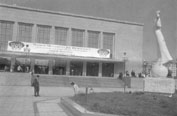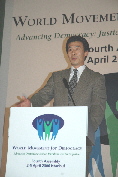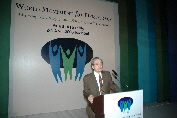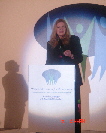
PARIS, 6th April 2006 – More than 600 democracy activists, practitioners and scholars from 125 countries gathered for the Fourth Assembly of the World Movement for Democracy (WMD) in Istanbul from 2-5 April 2006 under the theme of “Advancing Democracy : Justice, Pluralism and Participation”. Founded in 1999, the WMD held its first assembly in New Delhi, India, followed by Sao Paolo (Brazil, 2002) and Durban (South Africa, 2004). The Fourth Assembly was opened by Turkish Prime Minister Recep Tayyip Erdogan. Other speakers included Kim Campbell, Secretary-general of the Club of Madrid and former Canadian prime minister, and Anwar Ibrahim, former deputy prime minister of Malaysia.
“In a world in which prejudice and extremism continue to pose threats to peace and prosperity, the meeting is intended to support efforts to promote democracy and understanding within and between nations”, announced the WMD. In over 40 workshops, participants examined global and regional challenges to the development of democracy on themes such as the political participation of women and minorities, Islam and democracy, democracy and culture, the role of civil society and the media, political engagement of youth, the challenges of terrorism and counter-terrorism, promoting democracy in closed societies etc. Vo Van Ai, President of Quê Me : Action for Democracy in Vietnam and UBCV spokesman was invited to represent democracy movements of Vietnam.
A highlight of the Assembly was the presentation of the “Democracy Courage Tribute” at the closing ceremony on April 5th 2006. For the first time, the Tribute was awarded to two leaders of the Vietnamese democracy movement, Buddhist monk Thich Quang Do and Communist Party veteran Hoang Minh Chinh. Other recipients were civil society movements from Nepal, Uzbekistan and the Crimean Tatars. Vo Van Ai and Quê Me’s Vice-President Penelope Faulkner were invited to accept the tribute on behalf of Thich Quang Do and Hoang Minh Chinh, both of whom are under close Police surveillance and effective house arrest.

Presenting the award, prominent Chinese labour activist Han Dongfeng, said : “Tonight we are paying tribute to two individuals, extraordinarily inspiring figures who have struggled for decades to advocate democracy and political reform in Vietnam, and also to all those activists who have been a part of the same struggle. These men represent two very different currents of Vietnam’s democracy movement : one is secular, the other religious ; one is from the North, the other from the South ; one is a former high official of the regime ; the other is a leader of the outlawed Unified Buddhist Church of Vietnam.”
After describing the long years of detention and recent harassments suffered by Thich Quang Do, 76, and Hoang Minh Chinh, 84, Han Dongfeng said : “The treatment of these two activists is not unique. Vietnamese democracy activists have been arbitrarily detained, called traitors and slanderers, and their “rights” enshrined in Vietnam’s constitution and penal code, have been ignored. Still, the movement has managed to rally massive political pressure on the Government of Vietnam by exposing repressive actions to the international community, including the UN, parliaments and governments of democratic countries, the media and international human rights organizations. Recent contributions to the democratic struggle in Vietnam have included the use of cyberspace as well as traditional mediums to raise democratic awareness”.
He also commended Vo Van Ai, “a writer, philosopher and human rights activist who has devoted his life to raising international awareness of the drastic human rights situation in Vietnam”.

In accepting the tribute, Vo Van Ai said : “This a very important year for Vietnam. In November, President George W. Bush plans to attend the APEC Summit in Hanoi. The US State Department has given Vietnam a list of 26 prisoners of conscience, and asked that they be released before the summit takes place. Vietnam is also hoping to win membership of the World Trade Organisation within the year. By awarding this democracy tribute tonight, you are highlighting the plight of all Vietnamese activists detained for their peaceful pro-democracy activities, and putting human rights and democracy in Vietnam on the international agenda.
“For 2,000 years, Vietnam was one country, with one language and one culture. But conflicts of ideology split our country into two, north and south, separating our people and forcing them to live apart under different political regimes.

“The two dissidents you are honouring today, Thich Quang Do and Hoang Minh Chinh, reflect this political divide. Thich Quang Do in the South, symbolises the peaceful struggle of the Buddhists, Vietnam’s largest civil society and democracy movement. Hoang Minh Chinh in the North speaks out for a whole generation of Communist Party veterans and dissidents, who are calling out today for democratic reform.
“After the Vietnam war, the Communist Party re-unified Vietnam into one country, but they failed to unite the people’s hearts. Today, by recognising these men as members of the global democratic community, you are marking the emergence of a united democracy movement in Vietnam. At the same time, you are succeeding where the regime has failed, in unifying the Vietnamese people’s hearts”.
 Quê Me Quê Me: Action for democracy in Vietnam & Vietnam Committee on Human Rights
Quê Me Quê Me: Action for democracy in Vietnam & Vietnam Committee on Human Rights




